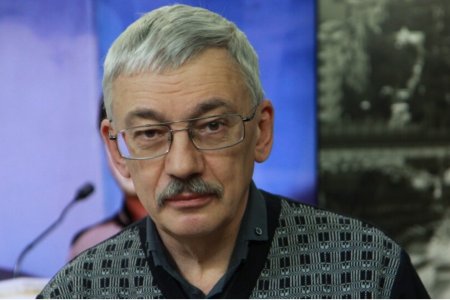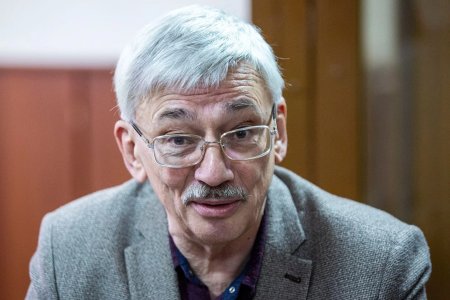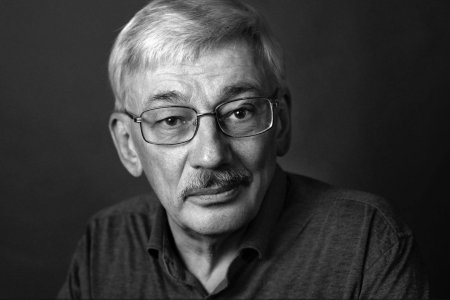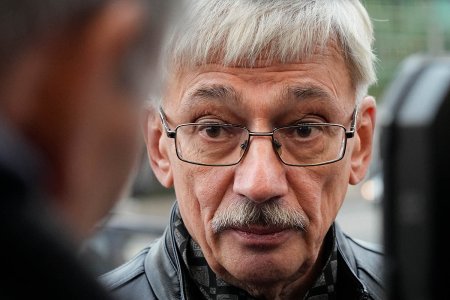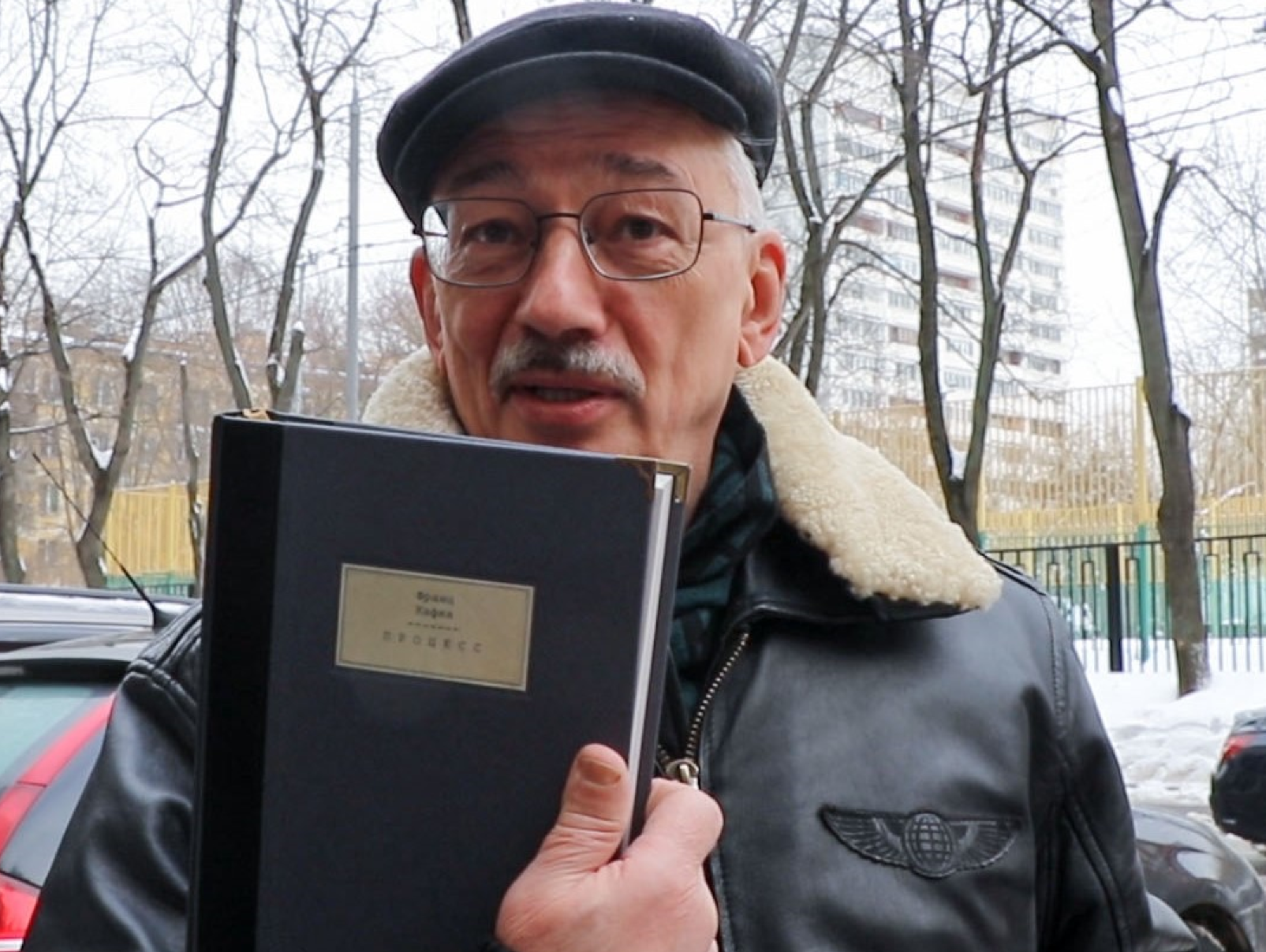
A court in Moscow has sentenced 70-year-old human rights veteran and Co-Chair of Memorial to two and a half years’ imprisonment for his criticism of Russia’s war of aggression against Ukraine and countless war crimes. This was a remake of the original ‘trial’ which ended on 11 October 2023, with Orlov being convicted of ‘discrediting the Russian armed forces’ but only fined.
In condemning the 2.5 year sentence passed on 27 February by ‘judge’ Yelena Astakhova from the Golovinsky district court in Moscow, Memorial said that Orlov had been tried and sentenced to imprisonment for calling things by their real names. Orlov himself had refused to participate in this farcical remake, agreeing only to give his final address to the court on 26 February. During this address, he said that he had used the time thus saved to re-read Franz Kafka’s “Trial’ and pointed to the similarities. He was charged with ‘repeat discrediting’ of Russia’s armed forces, however no attempt had been made to explain how such ‘discrediting’ differs from legitimate criticism. “We’re charged with circulating knowingly false information, with nobody bothering to demonstrate that it is false – this is exactly how the Soviet regime behaved, with any criticism labelled lies. And our attempts to prove that the information is true are grounds for criminal prosecution”.
Orlov stressed that he had not committed any crime, with his ‘trial’ over an article published in the media in which he had said that the current Russian regime had descended into fascist totalitarianism. Some had thought he was exaggerating, yet this had proven to be anything but the case. Orlov mentioned just some of the developments over the four months between these ‘trials’ which had proven that his assessment had been correct. He spoke of the ban on books by several contemporary writers; the extraordinary supreme court ruling that banned “a non-existent LGBT movement”; and the claim made by Russian leader Vladimir Putin (in his recent ‘interview’ to Kremlin-friendly propagandist Tucker Carlson) that the Poles had ‘forced’ Hitler to invade their country and begin WWII.
There are differences from the protagonist in Kafka’s novel who never learns what he is accused of and executed for. In Russia, Orlov notes, there is a formal charge, just one that is impossible to fathom within the framework of law or logic. The real reason for his ‘trial’ is, nonetheless, clear, namely that he criticized the regime – something which is now totally prohibited.
Orlov clearly had no illusions about the outcome of this ‘court trial’, but did address the judge and prosecutors, asking if they were not themselves afraid of what the country was turning into, of the likelihood that they too would be mowed down by the machine of repression. One day, he reminded them, their children or grandchildren would feel shame remembering what their parents or grandparents had done. In concluding, he stated “I regret nothing and have nothing to repent.”
It is possible that the real sentence passed on 27 February was that always intended, with the original fine intended to deflect international attention from such appalling persecution of the world-renowned Co-Head of Memorial, one of the laureates of the Nobel Peace Prize in 2022.
As reported, there were mass raids on the Memorial offices and homes of Memorial activists on 21 March 2023 with Orlov taken away for interrogation and charged with ‘discrediting Russia’s armed forces and its operations’ under Article 280.3 § 1 of Russia’s criminal code. The criminal charges were because Orlov had already been convicted in administrative prosecutions of the same basic charge (Article 20.3.3 of the RF code of administrative offences).
Orlov was charged over his posting on his Facebook page of the Russian translation of his article “They wanted fascism. They got it”, which was published by the French Mediapart on 14 November 2022. The article states, for example, that “The bloody war launched by Putin in Ukraine is not only the mass killing of people, the destruction of infrastructure, of the economy, of cultural sites of this wonderful country. It is not only the crushing of the foundations of international law. It is also the gravest of blows against Russia’s future. A country which, 30 years ago, moved from communist totalitarianism has descended back into totalitarianism, but now fascist.”
The first ‘trial’ was also at the Golovinsky district court and ended on 11 October 2023 with judge Kristina Kostryukova finding Orlov ‘guilty’ of the charge, but ‘only’ imposing a 150-thousand rouble fine. Although the maximum sentence according to the version of the code under which Orlov was charged was three years’ imprisonment, the prosecutors - Svetlana Kildysheva and M. I. Shcherbakova – had themselves asked for a fine, albeit steeper, of 250 thousand roubles.
By 26 October, the public prosecutor had lodged an appeal, claiming that the sentence was ‘too lenient’ and demanding the full three-year real term of imprisonment envisaged under Article 280.3 § 1. Then on 14 December, the prosecutor’s office changed its position and asked the Moscow city court to send the case back to the prosecutor as the investigator had, purportedly, not established the motive of the so-called ‘crime’. The court duly obliged, revoking the sentence and returning the case to the prosecutor.
Memorial reported on 30 January 2024 that the new ‘investigation’ had been completed and that the prosecution had found its new ‘motive’. The prosecutors had been helped in this by the ‘expert assessment’, although, Memorial noted, it was only on the third attempt that they got what they wanted. The new decision produced by ‘investigator’ Ilya Savchenko retained the same charge (under Article 280.3 § 1), but it was now claimed that there had been an aggravating circumstance, namely ‘motives of hatred and enmity’. This surreal indictment claimed that Orlov had been motivated by “ideological enmity towards traditional spiritual-moral and patriotic values” and also enmity towards “the social group of ‘military servicemen of the Russian Federation’s armed forces”. More details about how the old and new charges were concocted here.
The sentence demanded on 26 February and handed down the following day by Yelena Astakhova is for two and a half years in a medium security prison colony. The veteran human rights defender was taken into custody in the courtroom.
